Kill Bill’s Enduring Impact — Two Decades of Echoing Retribution
In 2004, Quentin Tarantino’s cinematic masterpiece, Kill Bill: Vol. 2, captivated audiences with its profound exploration of morality, vengeance, and the intricate dance between love and violence. Now, two decades later, the film’s influence continues to reverberate, casting a shadow on contemporary narratives of revenge. As we delve into the timeless narrative of Kill Bill, its characters, dialogues, and moral complexities demand a closer examination.
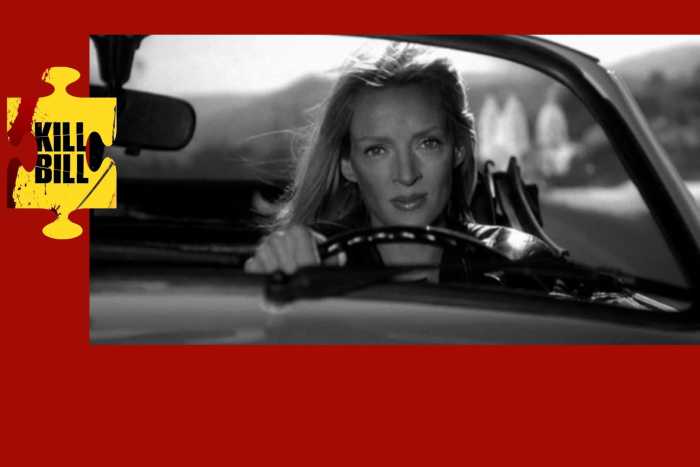
Quentin Tarantino’s magnum opus, Kill Bill, unfolds its cinematic narrative with a profound proclamation: “Revenge is a dish best served cold.” This timeless adage, brimming with thematic significance, has transcended the epochs of cinematic history, establishing itself as a recurring motif that seems impervious to the sands of time. Interestingly, the roots of this phrase trace back to the realms of science fiction, as it was first introduced in 1982 as a “Klingon proverb” in Star Trek II: The Wrath of Khan, though notably, it wasn’t uttered in the Klingon language. A cinematic bridge spanning across genres emerges when, in 2003, Kill Bill prominently features this proverb, presenting it in English and ascribing it to an “Old Klingon proverb.” This deliberate association creates a fascinating intertextuality, linking Tarantino’s revenge saga to the legacy of Star Trek II: The Wrath of Khan.
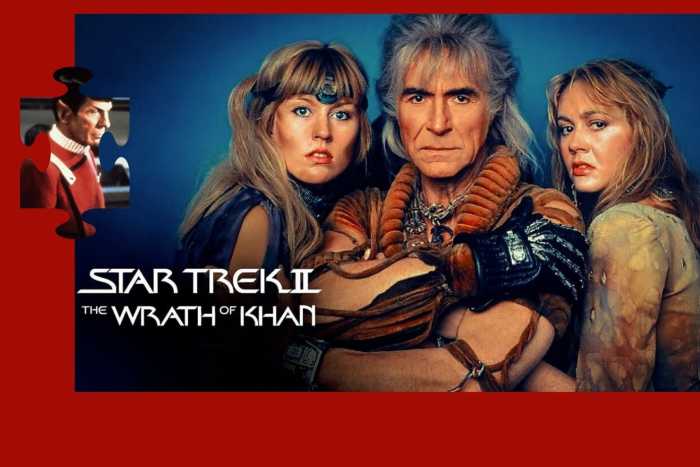
The interwoven tapestry of revenge narratives extends beyond cinematic boundaries, reaching into the realm of Italian westerns and classic literature. Notably, the Italian film La vendetta e’ un piatto che si serve freddo in 1971 echoed the sentiment of this timeless phrase, preceding the release of Kill Bill. Acknowledging the known influence of Italian westerns on Tarantino’s oeuvres, it becomes evident that the echoes of these films resonate in Kill Bill‘s narrative fabric. The western Death Rides a Horse in 1967 and Mario Puzo’s novel The Godfather in 1969 also bore witness to the evocative power of this adage. Disentangling fact from fiction, the origins of this expression date back to 1845 in the French novel Mathilde by Josephe Eugène Sue, debunking assertions of its presence in the 1782 book Les Liaisons dangereuses” (Dangerous Liaisons). Through this intricate web of cultural references and cinematic echoes, the resonance of this proverb across diverse narratives and epochs underscores its enduring allure and establishes it as a narrative leitmotif that transcends both time and genre. Revenge, it seems, is a tale as old as time, forever woven into the fabric of human storytelling.
At the heart of Kill Bill is the moral dilemma encapsulated in this phrase; however, this quest for retribution goes beyond the attempted murder of Beatrix Kiddo; it delves deep into the shared moral complexities of the characters, blurring the lines between cruelty and vulnerability. The film challenges the dichotomy of good and evil, presenting characters molded by instincts and circumstances. Bill’s revelation as an anti-hero adds layers to the narrative, transcending traditional character archetypes. His love for Beatrix, despite past actions, paints him as a complex figure. Themes of love, honor, and respect interweave, showcasing the intricate dance between morality and the consequences of irreversible actions.
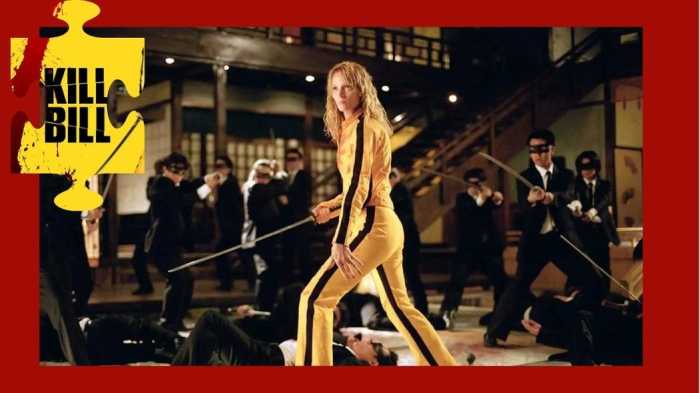
Examining pivotal dialogues from the climax of Kill Bill: Vol. 2 unveils the intricate moral tapestry woven into the narrative. For instance, the poignant dialogue between Bill and B.B. explores profound philosophical themes, including the consequences of actions, the irreversibility of choices, and the lasting impact of decisions. Bill parallels his relationship with Beatrix to B.B.’s own experiences, emphasizing the gravity of his actions. Their dialogue prompts contemplation on human agency, accountability, and the emotional toll of profound decisions, inviting audiences to reflect on enduring philosophical questions of morality, redemption, and the unavoidable repercussions of our actions. Bill’s analogy of a child’s accidental act—before actually killing her fish—becomes a metaphor for impulsive human actions, challenging notions of absolute good or evil. The film navigates through themes of love, honor, and respect, showcasing the intricate dance between morality and the consequences of irreversible actions.
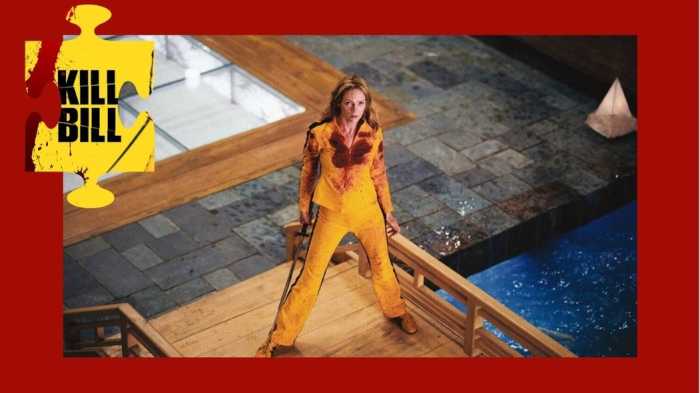
Also, the dialogues between Bill and Beatrix, especially concerning their daughter, highlight the film’s exploration of the dualities inherent in human nature. The contrast between Beatrix’s killer instincts and her role as a mother adds layers to her character, challenging conventional perceptions of morality. The climax intensifies as Bill confronts Beatrix using a truth serum, emphasizing the pursuit of truth and the consequences of deceit. Their interaction becomes a philosophical discourse on identity, morality, and the irreversible nature of certain actions, resonating with the broader theme of the film.
The cinematic spectacle concludes with a duel between Beatrix and Bill, showcasing the complexity of their relationship. He acknowledges her as an extraordinary person, despite what he labels as occasional reprehensible acts from her, which underscores the film’s refusal to categorize characters into simplistic binaries of good and evil. As Beatrix grapples with her emotions while ending Bill’s life, a nuanced portrayal of morality unfurls. Her tears, laughter, and conflicted expressions challenge the audience to question the nature of justice and the toll of a life driven by revenge. In the aftermath, Beatrix’s reflection on her journey as she looks at her daughter suggests that the cycle of retribution might continue, leaving the audience with lingering questions about the enduring impact of vengeance on the human psyche.
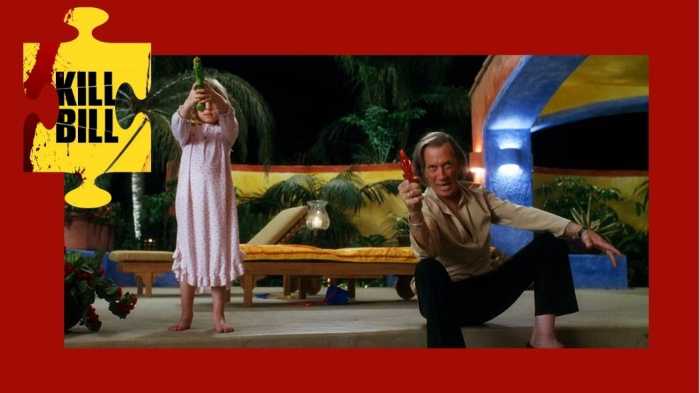
Also, while John Wick—launched a decade later—is lauded for its male avenger, the Kill Bill saga broke ground by spotlighting a formidable anti-heroine, paving the way for subsequent films, including the 2023 Korean movie, Kill Boksoon, to defy expectations and explore women in intense, violent lead roles, confronting and dismantling gender biases in the process.
Unveiling the Psyche of Revenge: Exploring the Depths of Kill Bill’s Influence
Quentin Tarantino’s exploration of revenge in Kill Bill delves deep into the psyche of its characters, unraveling the intricate motivations and consequences of their actions. The film serves as a microcosm of Tarantino’s larger body of work, which often grapples with themes of violence, redemption, and the human condition. By examining the psychological underpinnings of revenge, Tarantino invites audiences to confront uncomfortable truths about the nature of justice and the toll it takes on both the avenger and the target.
Throughout his career, Tarantino has demonstrated a fascination with characters who are driven by a primal desire for vengeance. From Jules Winnfield in Pulp Fiction to The Bride in Kill Bill, these characters embody a complex interplay of rage, guilt, and catharsis. In Kill Bill, Beatrix Kiddo’s journey from victim to avenger is a testament to Tarantino’s ability to craft compelling narratives that transcend mere spectacle. Her quest for revenge is not just about settling scores; it’s a journey of self-discovery and empowerment, as she confronts her demons and grapples with the consequences of her actions.
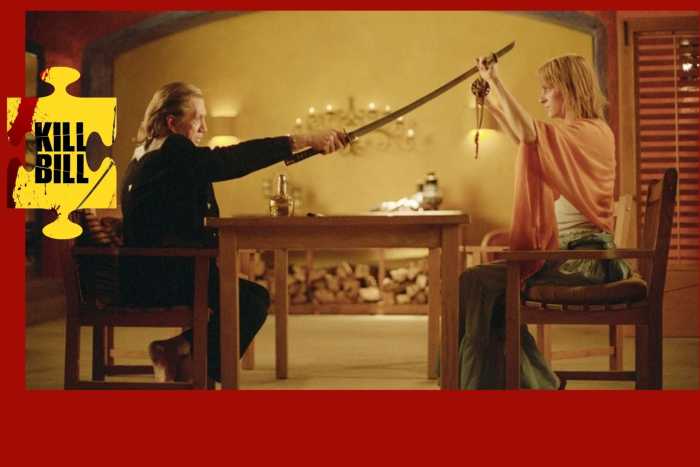
Moreover, Kill Bill exemplifies Tarantino’s unique approach to storytelling, which often eschews traditional narrative structures in favor of nonlinear plots and stylized dialogue. This unconventional approach allows Tarantino to delve into the psyche of his characters in ways that conventional storytelling cannot. By juxtaposing moments of extreme violence with introspective dialogue and flashbacks, Tarantino creates a rich tapestry of emotions and motivations that resonate with audiences on a visceral level.
The enduring appeal of Kill Bill lies in its ability to tap into universal truths about human nature and the complexities of revenge. By shining a spotlight on the psychological dynamics at play, Tarantino challenges audiences to confront their attitudes towards violence and justice. As the film approaches its third decade of influence, its exploration of morality, the complexities of human nature, and the psyche of revenge continue to resonate with audiences, cementing its status as a timeless masterpiece of cinema, the influence of which reverberates through the years, encapsulating the enduring appeal of stories centered around retribution.
As the cinematic landscape continues to evolve, Kill Bill stands as a testament to Tarantino’s ability to create narratives that transcend time and resonate with audiences across generations, with a legacy forever etched in the annals of cinematic history.
What do you think? Leave a comment.











Still my favorite movie of all time. Thanks for the retrospective, well done.
I saw this movie when it came out in a old 1950s movie theater right before the movie theater close. It was definitely the way it was intended to be watch.
Forgive my boldness, but how old are you?
We got to watch Kill Bill in class at high school. That’s how much our arts teacher loved it.
This movies is practically a rip off of the film Lady Snowblood. The end song of kill Bill is even one composed for Lady Snow blood haha. I still love this both films, each is totally worth the watch!
Years ago i was in a band called beatrix, it was an homage to this movie, and also at around the same time i had a bootleg dvd of the extended version, with the battle with the crazy 88s being in color and it had a bunch of extended scenes, but it was only volume 1…i do see both volumes as one movie so i would of liked having the bootleg for that too but i couldnt find it.
Kill bill is easily the BEST Tarantino movie!
I grew up in the 70’s and watched kung-fu I absolutely loved this movie it reminded me of the carnage I went through in a bad car wreck the conquer death and life senerio was real.
Love it when QT switches to black and white when it’s about to get real bloody.
This movie. Yes movie. Both volumes as one. Should be taught in film schools on how to make a strong female lead. I watched this after about a 10 year hiatus. It is so refreshing to watch a movie where the lead isn’t some girl boss who has no struggles and then has to lecture us about how being a woman is hard and how men are terrible.
I like all Tarantinos movies. Jackie Browns is probably my favourite now but I love Grindhouse / Death Proof and I enjoyed Kill Bill as well… Kill Bill 3 obviously wouldn’t be called Kill Bill 3. It could be this kung fu movie in Mandarin he has been talking about.
I equate Quentin Tarantino as the George A. Romero of our time. He made a couple of really good films while the rest have been pale shadows that may have preserved his style but lacking in any substance.
Some of his movies are great, some aren’t, big whoop. That makes him the same as any other great director. Every single one of them has a brilliant soundtrack though, and if you think they’re all a bunch of tired surf tunes, you clearly haven’t been listening. Maybe he should compile a bunch of playlists, then give them to a bunch of directors to construct some movies around. That seems to be how he writes the scripts sometimes.
Kill Bill Vol. 3 should be a miniseries! A multi-part extravaganza!
I loved this one since it came out. But I watched it again tonight, and I feel like its an absolute classic. The first and second one are brilliant. When I was younger I didnt like the second one as its less action packed.
But now, I feel like part 2 is on the same level of brilliance as the first. Perhaps even better. I feel like the semi anti-climax is really well done as it portrays two ex-lovers confronting each other and talking. After all the over the top action and violence, this ending makes the whole saga believable and human.
A Masterpiece. Both parts really. I loved part 2 even more..Ivé always did. The final showdown with Bill is one of the best long scenes ever. Now waiting for Tarantino’s 10th instalment..I go with the (perhaps his) idea for Kill Bill 3 filnal part..where the daughter of Vivica goes on a revenge mission and we learn a lot more about her relasion with Bill and other characters.. a movie poster once was released..it was fan-based material..considering Zendaya as playing the role for the young assasin..and after all..what would probaly more fit a 10th film and final movie more then his own property..again…after all these years..ofcourse..Kill Bill for the last time..He has got so many ideas for a 3rd movie ..he always did..fans are waiting for it..Final note: his last and final movie..QT 10th movie: Kill Bill – Final Act..
We’ll see George R.R. Martin’s book series finished before Kill Bill 3 comes out; anyhow, no 3rd movie is necessary, the story is perfect, as is.
I think Kill Bill is Quentin Tarantino’s worst movie, and it’s never referenced in conversations I have with people about films. Pulp Fiction, Inglorious Basterds, Django Unchained and the Hollywood one are the usual fare. I like some old school martial arts movies, but Kill Bill was too over-the-top for my taste. Like, the originals were weird due to tech limitations and budgetary constraints. Somehow, the intentional campiness in this movie just makes the whole thing lose its charm
First time I saw kill Bill helped me rekindle my love for cinema.
Great article! It was a pleasure to edit, and, it’s great to see it on the site! Very thought provoking look into Kill Bill and what makes it different from similar movies.
I would LOVE to have more back-story on Bill, Budd, and ALL his Vipers.
I believe that Kill Bill volume 3 should ironically enough, not be named that at all. I think it should be titled: “Kill Kiddo” or “Kill Beatrix”
Since Bill has already been killed. This will be a spiritual successor to the last two movies. As for who should be going after the bride in order to kill her?
It’s a phenomenal classic!
I never understood the fuss about Kill Bill, i thought it was cheap and kind of shitty, not very funny, not very cool and just generally naff. Inglorious B… looks even worse. Are these costume party, wendy house films for people who are just a bit crap? Why make a 3rd episode of this bollocks unless you have a horde of dimwits who do think its cool?
Not finding Kill Bill cool, doesnt make you “too cool for school”, it rather suggests that your critical faculties are at least a tick higher than those of a St Bernard.
Can’t wait for the third film!
Kill Bill is the movie you show someone who doesn’t know who Quentin Tarantino is. They’ll know exactly who he is afterwards, and then when you show them something like Pulp Fiction or Inglorious Basterds, they’ll totally get it.
This was my first QT movie and he blew me away. It is a tour de force of directorial skill. You can see him putting his feet into so many genres (Italian Westerns, anime, 70s blaxploitation, Kung Fu…) And dancing circles around the other guys. In this movie, one discovers QT is a genius.
Jackie Brown is his best movie.
Kill Bill 1 & 2 is my favorite movie of all time, hands down. Pure cinematic perfection imo, and so layered throughout.
Vol 2 had its moments a nice wrap up, but I think it would have been better as a single , epic-length movie.
Just watched full movie for the first time today and I loved it!
I miss this “less serious” Tarantino.
If we ever get a Kill Bill game, the combat should be similar to the Arkham series..
In my top 5 favorite movie of all time.
I remember the hype for this movie back in the day. I’m a big fan of both Quentin and asian movies and I saw it in the cinema but Kill Bill didn’t click with me whatsoever. Recently gave it another watch and still felt the same way. I find it to be an absolutely average movie.
I love Kill Bill and often rewatch it. The trailer fight between Elle and the Bride is IMO the greatest female fight scene in cinematic history. In the early ‘70s I was a Bruce Lee fan; Kill Bill has that same je ne sais quoi. The fight choreography is as great as anything Bob Fosse or Gene Kelly has ever done, and more than equal to that of Bruce Lee.
Kill Bill 3 all children come together take revenge but they all come from the same syndicate better parents work. So she realized she has takes temperature because they’re making children killers that sounds like a good idea.
This is litteraly the only movie i like uma therman in, but man in this she’s great.
The Bride / Beatrix is the best representation of how to make badaas female character without forcing them to be badaas. We see how she struggled in Pai Mei’s training especially the fact she can’t speak Mandarin and keep determined even though Pai Mei did a lot of harsh treatment to her. Also, she respects Pai Mei no matter what unlike Elle and that’s how she lost her eye.
Both movies are my joy to watch! 1st then 2nd! I got an 83-Inch Screen with a subwoofer and I hope I don’t annoy my neighbors? Such a joy for me to plain on watching both movies and it’s like I always saw something I missed the 1st, 2nd, etc., but I love it and a part 3? That would be so great!
Quentin is a creep but you gotta love his work.
Not really a big fan of Tarantino’s films, but I do love Uma Thurman. She was amazing here and made Pulp Fiction for me….
It ended and then became a classic. Oops sorry for the spoilers.
Kill Bill is Tarantino’s most overrated movie.
This is QT at his best – I haven’t really found his newer movies very interesting, just overly long talkfests.
I never understood why there had to be a part one and two. I saw a long-drawn-out movie that could have been reduced to one movie. Much of that I suspect comes from dialogue that just dragged on and could have been cut or eliminated.
Uma in the yellow jumpsuit is simply iconic. Tarantino’s ability to create images that last the years, especially early in his career, is simply astounding.